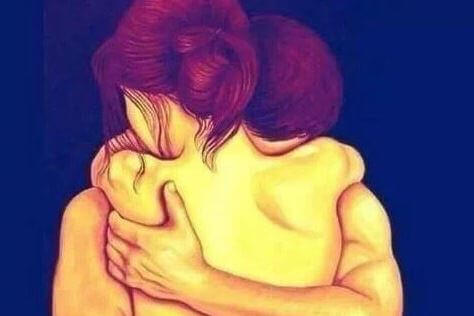Factors That Limit Sexual Desire


Written and verified by the psychologist Sergio De Dios González
Your sexual desire, or libido, can be affected by many factors, some of which you probably don’t even know about or certainly don’t give enough importance to. The cause of a reduction in libido can be organic, psychological, emotional, or social. Furthermore, there’s little doubt that a decrease or lack of sexual desire is a problem. It can even be a sign of sexual dysfunction, which will generate great anguish.
Let’s start by defining sexual desire. Although it’s a difficult concept to pin down, in sexology, it refers to sexual appetite. It’s the energy or tendency of the will to achieve and experience pleasure. This is the product of a complex interaction between cognitive and physiological processes, and neurophysiological and biochemical mechanisms.
Libido is strongly allied with the experience of pleasure. Therefore, an experience that generates discomfort or aversion and thus displeasure will inhibit sexual desire.
The pleasure experienced in a situation creates an emotional imprint that gives rise to desire. It’s only by remembering it that it’s possible to activate it. This is what happens with sexual fantasies and erotic objects that serve as triggers for sexual desire.
Do you have enough sexual desire?
Many people tend to compare their sexual desire with that of other people, or with that of their partner. This is a mistake. That’s because it’s individualized and everyone experiences it in a different way. This is due to various interacting reasons and factors.
Sexual desire becomes a problem when the individual feels uncomfortable about it, regardless of whether it’s greater or lesser than that of their partner.
It must be taken into account that sexual desire is a secondary need (needs related to the quality of life). In other words, it’s not of vital importance for survival. Therefore, if there are primary needs that are not addressed, like rest, for example, it will be relegated and, consequently, will decrease.
Sexual desire feeds on excess energy. Consequently, if this energy is absent or is focused exclusively on other types of activities, libido will decrease (hypoactive sexual desire). As a matter of fact, our current pace of life is a natural enemy of libido due to causes such as stress and accumulated fatigue.

Tiredness is the enemy of libido
Fatigue, both physical and mental, is a relevant factor in life today. It influences your decisions, behavior, motivations, sensations, and ability to experience pleasure.
According to a study of more than 5,000 men, published in The Journal of Sexual Medicine, tiredness and stress represent one of the main causes of low libido.
Giving the factor of fatigue in sexual relations the importance it deserves helps us to be more understanding. This means that we don’t adopt the wrong ideas that lead to misunderstandings.
Problems in a relationship
We can’t ignore the fact that sexual relations are a fundamental aspect of a couple’s relationship. Indeed, if there’s dissatisfaction in the sexual area, it can cause deterioration in the relationship itself.
Problems that exist in a couple’s relationship, such as anger, conflict, lack of communication, insecurity, etc., are direct causes of decreased libido. This means that sexual encounters become unsatisfactory.
However, some couples, after experiencing anger or intense arguments, feel a tremendous impulse to have sexual relations. This happens because they’ve eroticized the conflict, and have made an association between pleasure and discussion. Nevertheless, in general, anger and discomfort with the partner cause inhibition of sexual desire (hypoactive sexual desire).

Other related factors
Among the biological factors that are related to a decrease in libido are drugs. For example, antidepressants, birth control pills, and all those that decrease dopamine. Also, the kinds of drugs that increase serotonin.
Among the associated psychological factors, the fear of desire has a great influence. For instance, after having gone through a bad experience, it might be possible to associate desire with danger. Therefore, the defense is to inhibit it. Reduction in libido also influences depression, anxiety, and self-esteem problems.
Emotions such as fear, anger, shame, etc., also have an inhibiting effect on libido. Among the social factors, it’s worth highlighting affective models of reference, repressive education, lack of sexual information, and first sexual encounters and the expectations formed.
All of the factors that we’ve listed here form part of deeper and more complex problems. In fact, those who experience a lack of desire with discomfort, anguish, and a deterioration in their quality of life may be suffering from sexual dysfunction.
Finally, those who experience sexual desire with discomfort should go to a sexologist. Depending on the most predominant factors, the sexologist may either address the problems themselves or refer the patient to a doctor or specialist psychologist.
Your sexual desire, or libido, can be affected by many factors, some of which you probably don’t even know about or certainly don’t give enough importance to. The cause of a reduction in libido can be organic, psychological, emotional, or social. Furthermore, there’s little doubt that a decrease or lack of sexual desire is a problem. It can even be a sign of sexual dysfunction, which will generate great anguish.
Let’s start by defining sexual desire. Although it’s a difficult concept to pin down, in sexology, it refers to sexual appetite. It’s the energy or tendency of the will to achieve and experience pleasure. This is the product of a complex interaction between cognitive and physiological processes, and neurophysiological and biochemical mechanisms.
Libido is strongly allied with the experience of pleasure. Therefore, an experience that generates discomfort or aversion and thus displeasure will inhibit sexual desire.
The pleasure experienced in a situation creates an emotional imprint that gives rise to desire. It’s only by remembering it that it’s possible to activate it. This is what happens with sexual fantasies and erotic objects that serve as triggers for sexual desire.
Do you have enough sexual desire?
Many people tend to compare their sexual desire with that of other people, or with that of their partner. This is a mistake. That’s because it’s individualized and everyone experiences it in a different way. This is due to various interacting reasons and factors.
Sexual desire becomes a problem when the individual feels uncomfortable about it, regardless of whether it’s greater or lesser than that of their partner.
It must be taken into account that sexual desire is a secondary need (needs related to the quality of life). In other words, it’s not of vital importance for survival. Therefore, if there are primary needs that are not addressed, like rest, for example, it will be relegated and, consequently, will decrease.
Sexual desire feeds on excess energy. Consequently, if this energy is absent or is focused exclusively on other types of activities, libido will decrease (hypoactive sexual desire). As a matter of fact, our current pace of life is a natural enemy of libido due to causes such as stress and accumulated fatigue.

Tiredness is the enemy of libido
Fatigue, both physical and mental, is a relevant factor in life today. It influences your decisions, behavior, motivations, sensations, and ability to experience pleasure.
According to a study of more than 5,000 men, published in The Journal of Sexual Medicine, tiredness and stress represent one of the main causes of low libido.
Giving the factor of fatigue in sexual relations the importance it deserves helps us to be more understanding. This means that we don’t adopt the wrong ideas that lead to misunderstandings.
Problems in a relationship
We can’t ignore the fact that sexual relations are a fundamental aspect of a couple’s relationship. Indeed, if there’s dissatisfaction in the sexual area, it can cause deterioration in the relationship itself.
Problems that exist in a couple’s relationship, such as anger, conflict, lack of communication, insecurity, etc., are direct causes of decreased libido. This means that sexual encounters become unsatisfactory.
However, some couples, after experiencing anger or intense arguments, feel a tremendous impulse to have sexual relations. This happens because they’ve eroticized the conflict, and have made an association between pleasure and discussion. Nevertheless, in general, anger and discomfort with the partner cause inhibition of sexual desire (hypoactive sexual desire).

Other related factors
Among the biological factors that are related to a decrease in libido are drugs. For example, antidepressants, birth control pills, and all those that decrease dopamine. Also, the kinds of drugs that increase serotonin.
Among the associated psychological factors, the fear of desire has a great influence. For instance, after having gone through a bad experience, it might be possible to associate desire with danger. Therefore, the defense is to inhibit it. Reduction in libido also influences depression, anxiety, and self-esteem problems.
Emotions such as fear, anger, shame, etc., also have an inhibiting effect on libido. Among the social factors, it’s worth highlighting affective models of reference, repressive education, lack of sexual information, and first sexual encounters and the expectations formed.
All of the factors that we’ve listed here form part of deeper and more complex problems. In fact, those who experience a lack of desire with discomfort, anguish, and a deterioration in their quality of life may be suffering from sexual dysfunction.
Finally, those who experience sexual desire with discomfort should go to a sexologist. Depending on the most predominant factors, the sexologist may either address the problems themselves or refer the patient to a doctor or specialist psychologist.
This text is provided for informational purposes only and does not replace consultation with a professional. If in doubt, consult your specialist.







